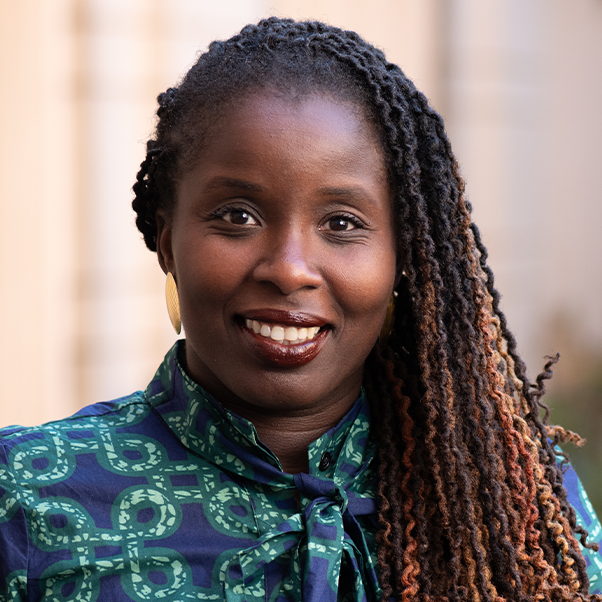Professor Matiangai Sirleaf is an interdisciplinary international scholar, justice seeker, and human rights advocate who has worked to unearth unjust hierarchies embedded in international law and to remedy the inequities that emerge and persist.
She is the Nathan Patz Professor of Law at the University of Maryland Francis King Carey School of Law. She holds a secondary appointment as a professor in the Department of Epidemiology and Public Health at the University of Maryland School of Medicine.
Professor Sirleaf has published widely and extensively. Her areas of expertise include public international law, international human rights law, global public health law, international criminal law, post-conflict and transitional justice, and criminal law. Her current research projects are focused on race and the histories of international human rights and health inequality and the law.
Professor Sirleaf is working on her forthcoming book with Cambridge University Press, There Are Black People in the Past: Reclaiming Our Time in Human Rights. She is the editor of the first thematic print volume on Race & National Security (2023) with Oxford University Press. The American Society of International Law awarded it the Certificate for High Technical Craftsmanship and Utility to Practicing Lawyers and Scholars in 2025. It has also been favorably reviewed in the American Journal of International Law, Harvard Law School National Security Journal and Jotwell. Her work has been featured in leading law reviews such as the Cardozo Law Review, the Columbia Law Review, the Texas Law Review, and the UCLA Law Review. Professor Sirleaf’s writing also appears in peer reviewed journals like the International Journal for Transitional Justice and the Journal of Law Medicine & Ethics, as well as several textbooks with Oxford University Press like Foundations of Global Health & Human Rights (2020) and Global Health Law & Policy: Ensuring Justice for a Healthier World (2023).
Her commentary and reflections also appear in several fora such as, AfronomicsLaw, American Journal of International Law, American Journal of International Law Unbound, American Society of International Law Insights, Bill of Health, Journal of Law, Medicine & Ethics, Jurist, Just Security, Opinio Juris, and Third World Approaches to International Law Review.
Professor Sirleaf’s research can be broadly categorized as critical international legal scholarship. Specifically, much of her writing falls in line with the Third World Approaches to International Law (TWAIL) tradition. TWAIL scholarship reconsiders the history and development of international law and highlights its colonial legacy. She has engaged in several projects where she looks at the embedded and hidden histories of international law in national security, in human rights, and in global health. Professor Sirleaf is passionate about examining how international law can conceal the incredibly unjust status quo, divert attention from its oppressive character, and potentially limit organizing for alternative ways of being. The common thread through her work, whether examining issues of racial justice, civil and political or socio-economic rights, is hierarchy. International law reifies hierarchy while her scholarship seeks to disrupt it and envision more emancipatory futures.
The interdisciplinary nature of Professor Sirleaf’s work has led to invited keynotes, plenary panelists presentations and lecture invitations from a wide range of institutions within and outside of law schools globally. The strength, breadth and depth of her scholarship has also resulted in several leadership positions, including as executive editor at Just Security and as a member of the board of editors of the American Journal of International Law.
Professor Sirleaf has received several prestigious grants, awards, fellowships, and other honors. These include recognition by Public Justice of a team (on which she participated) of attorneys with the 2024 Trial Lawyer of the Year Award, a fellow of the American Bar Foundation (2023), the University of Pittsburgh’s Teaming Grant (2020), the University of Pittsburgh Chancellor’s Distinguished Research Award (2019), the American Society of Law, Medicine & Ethics Health Law Scholar Selection (2019), the University Center for International Studies Faculty Fellowship (2018-2019), the Ford Institute for Human Security Research Grant (2016-2018), the New York University Martin Luther King, Jr. Humanitarian Award (2014), and a Fulbright Fellowship (2004).
Professor Sirleaf previously served as an associate professor of law at the University of Pittsburgh School of Law, as an assistant professor of law at the University of Baltimore School of Law, as well as a Sharswood Fellow at the University of Pennsylvania Law School.
She held several attorney and fellow roles prior to entering academia. These roles include Human Rights Fellow at Cohen Milstein Sellers & Toll (2010-2012); law clerk, Chief Justice Sandile Ngcobo, Constitutional Court of South Africa (2009-2010); and Bernstein Fellow at the International Center for Transitional Justice (2008-2009).

